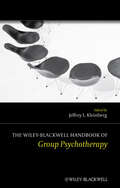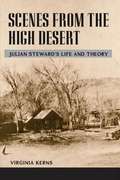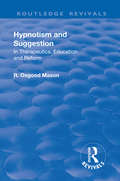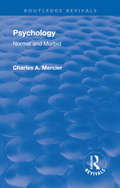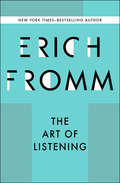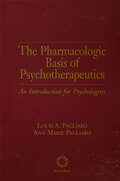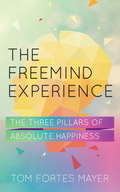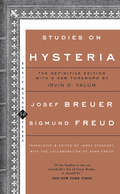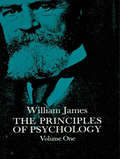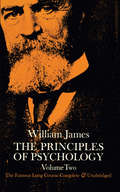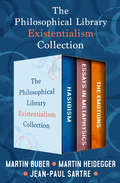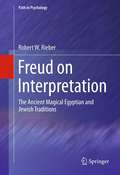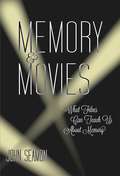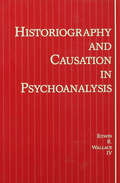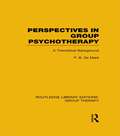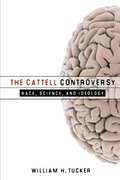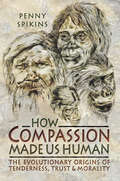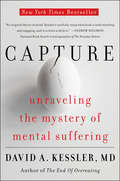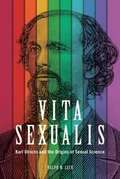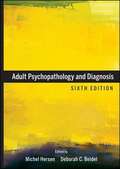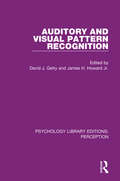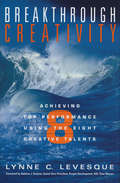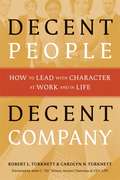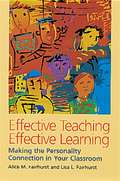- Table View
- List View
The Wiley-Blackwell Handbook of Group Psychotherapy
by Jeffrey L. KleinbergA user-friendly guide of best practice for leading groups in various settings and with different populations, which incorporates the latest developments in today's mental health marketplace.Features multiple theoretical perspectives and guidelines for running groups for diverse populations, in the US and worldwideOffers modern approaches and practical suggestions in a user-friendly and jargon-free style, with many clinical examplesIncludes a major component on resiliency and trauma relief work, and explores its impact on cliniciansAccompanied by an online resource featuring discussions of psychotherapeutic techniques in practice
Scenes from the High Desert: Julian Steward's Life and Theory
by Virginia KernsJulian Steward (1902-72) is best remembered in American anthropology as the creator of cultural ecology, a theoretical approach that has influenced generations of archaeologists and cultural anthropologists. Virginia Kerns considers the intellectual and emotional influences of Steward's remarkable career, exploring his early life in the American West, his continued attachments to western landscapes and inhabitants, his research with Native Americans, and the writing of his classic work, Theory of Culture Change. With fluid prose and rich detail, the book captures the essence and breadth of Steward's career while carefully measuring the ways he reinforced the male-centered structure of mid-twentieth-century American anthropology.
Revival: In Therapeutics, Education and Reform (Routledge Revivals)
by R. Osgood MasonThe volume here presented does not assume to be a systematic treatise upon hypnotism, nor even upon its therapeutic uses; for that the works of Bernheim, Moll, Wetterstrand, Tuckey and others may suffice – but there are certain phases of hypnotism which seem to the author to be of special interest and present importance, and it is for the purpose of distinctly presenting these special phases that the following chapters have been prepared.
Revival: Psychology: Normal and Morbid (Routledge Revivals)
by Charles Arthur MercierInsanity is no exception to the rule which requires a knowledge of the normal as an indispensable preliminary to a knowledge of the abnormal. This book, published in 1901, aimed to provide the first systematic examination of the disorders of the mind as arranged and correlated with the normal types from which they arringly depart.
The Art of Listening
by Erich FrommA thoughtful examination of psychotherapy from Erich Fromm, a celebrated leader in the fieldOver the course of a distinguished career, Erich Fromm built a reputation as a talented speaker and gifted psychoanalyst--the first specialization of this polymath. The Art of Listening is a transcription of a seminar Fromm gave in 1974 to American students in Switzerland. It provides insight into Fromm's therapy techniques as well as his thoughts and mindset while working. In this intimate look at his profession, Fromm dismantles psychoanalysis and then reassembles it in a clear and engaging fashion. This ebook features an illustrated biography of Erich Fromm including rare images and never-before-seen documents from the author's estate.
The Pharmacologic Basis of Psychotherapeutics: An Introduction For Psychologists
by Louis A. Pagliaro Ann M. PagliaroFirst published in 1998. Routledge is an imprint of Taylor & Francis, an informa company.
The FreeMind Experience
by Tom Fortes MayerA manifesto for creating a life that you will want to celebrate using Tom's unique "Three Pillars" approach to peace, power and purpose - to encourage original ways of making sense of the world, to free yourself of all resistances and enable all-round deep self-healing. Tom takes his experiences and skills as a counselor and hypnotherapist and puts them into this life-changing book. The result is a fascinating look at what real happiness is and how we can enjoy more of it. The FreeMind Experience combines teachings from the world's ancient wisdom traditions with the most scientifically-advanced rapid-behavior-change techniques. The book presents with clarity, passion and playfulness the three pillars upon which all lasting happiness and success can be built: Pillar 1: Peace (emotional intelligence and deprogramming fear) - how to let go of the limiting thoughts, beliefs, feelings and behaviors that are holding you back; Pillar 2: Power (success psychology) - how to unleash your enormous potential and flow through life with brilliance by learning to relate to life in new ways; Pillar 3: Purpose (unconditional love) - how to enjoy everything that matters most by experiencing more connection, contribution and celebration. By working through this program, you will understand why you think as you do, how you can escape from the thinking that keeps you afraid and emotionally stunted, and how you can connect to a deep, lasting happiness. This is the FreeMind experience.
Studies On Hysteria
by Sigmund Freud Joseph BreuerThe cornerstone of psychoanalysis-and legacy of the landmark Freud/Breuer collaboration-featuring the classic case of Anna O. and the evolution of the cathartic method, in the definitive Strachey translation. Re-packaged for the contemporary audience with what promises to be an unconventional foreword by Irvin Yalom, the novelist and psychiatrist who imagined Breuer in When Nietzsche Wept.
The Principles of Psychology, Vol. 1
by William JamesVolume 1 of the famous long course, complete and unabridged. Stream of thought, time perception, memory, experimental methods -- these are only some of the concerns of a work that was years ahead of its time and is still valid, interesting and useful. Total in set: 94 figures.
The Principles of Psychology, Vol. 2
by William JamesThis is the first inexpensive edition of the complete Long Course in Principles of Psychology, one of the great classics of modern Western literature and science and the source of the ripest thoughts of America’s most important philosopher. As such, it should not be confused with the many abridgements that omit key sections.The book presents lucid descriptions of human mental activity, with detailed considerations of the stream of thought, consciousness, time perception, memory, imagination, emotions, reason, abnormal phenomena, and similar topics. In its course it takes into account the work of Berkeley, Binet, Bradley, Darwin, Descartes, Fechner, Galton, Green, Helmholtz, Herbart, Hume, Janet, Kant, Lange, Lotze, Locke, Mill, Royce, Schopenhauer, Spinoza, Wundt, and scores of others. It examines contrasting interpretations of mental phenomena, treating introspective analysis, philosophical interpretations, and experimental research.Although the book originally appeared nearly 75 years ago, it remains unsurpassed today as a brilliantly written survey of William James’ timeless view of psychology.
The Philosophical Library Existentialism Collection: Hasidism, Essays in Metaphysics, and The Emotions
by Martin Buber Martin Heidegger Jean-Paul SartreExplore the work of three great existential philosophers together in this collection. Hasidism: Zionist philosopher Martin Buber shares the results of forty years of study and introduces the philosophies of Hasidism to a Western audience. In this modern masterpiece, Buber interprets the ideas and motives that underlie the great Jewish religious movement of Hasidism and its creator, Baal Shem. Essays in Metaphysics: German philosopher Martin Heidegger presents two lectures in which he explores the nature of identity in the history of metaphysics. He offers illuminating insights on vital issues like technology, religion, language, history, and more. The Emotions: French philosopher Jean-Paul Sartre attempts to understand the role emotions play in the human psyche. Sartre analyzes fear, lust, anguish, and melancholy while asserting that human beings begin to develop emotional capabilities from a very early age, which helps them identify and understand the emotions&’ names and qualities later in life.
Freud on Interpretation
by Robert W RieberThis book presents new insights into Freud's famous "discovery" of the unconscious and the subsequent development of psychoanalytic theories. The authors explore the original context in which these ideas arose and the central debate about mind as matter or something that transcends matter. In the course of this examination, it is demonstrated that Freud was influenced not only by the 19th century scientific milieu, but also by ancient cultures. While it is known that Freud was an avid collector of ancient artifacts and generally interested in these older cultures, this book systematically investigates their profound effect on his thinking and theorizing. Two major influences, Egyptian mythology and Jewish mysticism are analyzed in terms of similarities to Freud's emerging ideas about the mind and its diseases. To further this line of investigation, Bakan supplies an illuminating discussion of what it means to interpret. Taken from the viewpoint that interpretation involves an u
Memory and Movies
by John SeamonIn the movie Slumdog Millionaire, the childhood memories of a young game show contestant trigger his correct answers. In Memento, the amnesiac hero uses tattoos as memory aids. In Away from Her, an older woman suffering from dementia no longer remembers who her husband is. These are compelling films that tell affecting stories about the human condition. But what can these movies teach us about memory? In this book, John Seamon shows how examining the treatment of memory in popular movies can shed new light on how human memory works. After explaining that memory is actually a diverse collection of independent systems, Seamon uses examples from movies to offer an accessible, nontechnical description of what science knows about memory function and dysfunction. In a series of lively encounters with numerous popular films, he draws on Life of Pi and Avatar, for example, to explain working memory, used for short-term retention. He describes the process of long-term memory with examples from such films as Cast Away and Groundhog Day; The Return of Martin Guerre, among other movies, informs his account of how we recognize people; the effect of emotion on autobiographical memory is illustrated by The Kite Runner, Titanic, and other films; movies including Born on the Fourth of July and Rachel Getting Married illustrate the complex pain of traumatic memories. Seamon shows us that movies rarely get amnesia right, often using strategically timed blows to the protagonist's head as a way to turn memory off and then on again (as in Desperately Seeking Susan). Finally, he uses movies including On Golden Pond and Amour to describe the memory loss that often accompanies aging, while highlighting effective ways to maintain memory function.
Historiography and Causation in Psychoanalysis
by Edwin R. Wallace, IVWhat do the psychoanalyst and the historian have in common? This important question has stimulated a lively debate within the psychoanalytic profession in recent years, bearing as it does on the very nature of the psychoanalytic enterprise. Edwin Wallace, a clinician with training in the history and philosophy of science, brings a ranging scholarly perspective to the debate, mediating between rival perspectives and clarifying the issues at stake in the process of offering his own thoughtful conception of the historical nature of psychoanalysis. For Wallace, the procedures, problems, and interpretive possibilities of psychoanalysis and history are strikingly constant and mutually illuminating. He insists, further, that the fundamentally historical nature of psychoanalysis poses no threat to its scientific dignity. In arriving at this verdict, Wallace pushes beyond his expansive treatment of the many parallels between history and psychoanalysis to a systematic consideration of the problem of causation in both disciplines. Tracing the historical background of causation in science, philosophy, history, and analysis, he offers a logical analysis of determinism and a critique of causal language in psychoanalysis while adumbrating the historical character of psychoanalytic explanation. Historiography and Causation in Psychoanalysis is a thought-provoking work that cuts across disciplinary boundaries. It will cultivate the historical sensibilities of all its clinical readers, broadening and deepening the intellectual perspective they bring to the dialogue about the nature of psychoanalytic work. Timely and rewarding reading for analysts, psychiatrists, and clinical psychologists, it will be welcomed by historians and philosophers as well.
Perspectives in Group Psychotherapy: A Theoretical Background (Routledge Library Editions: Group Therapy)
by P.B. de MaréThis book, originally published in 1972, aimed to provide a theoretical framework for group therapists to guide them through the mass of variables which beset them. Its scope therefore is extremely broad, for it also touches on philosophy, psychology, sociology, communication and general systems theory. In the last chapter certain conclusions are drawn concerning the relationship between group and psycho-dynamics. The book will be of interest to those who have already had some experience of small, medium or large groups, and who want to think about their work in more general terms: it was not at the time widely realised how radically different and how potentially powerful are the implications of group procedures, not only for therapy but in such fields as education, industry and politics. Freud recognised this when he pointed out the dilemma of having to procure for the group precisely those features which were characteristic of the individual, and which are extinguished in him by the formation of the group. Whilst the problem for the individual is the intrusion of unconscious factors, for the group it is the group’s equivalent of consciousness, namely communication and organization, which is in a quandary. The group model differs crucially from the psychological, but they may relate in the sense that, as Freud indicated, neurosis represents a recapitulation within the individual of mankind’s group history. The unconscious mind, then, is a group phenomenon. In other words, group theory turns psychoanalysis upside down and begins at the point where Freud left off, relating neurosis to its social sources. In the light of the group approach, therefore, neurosis and certain of the psychoses can be viewed as localized deposits of unresolved group experiences within the individual, whether they be past, current or an expectation of the future; a feature which makes traumatic neuroses more understandable since they cannot be explained in terms of infantile neurosis. The author suggested the possibility of a new development in group techniques, namely that of large group therapy freed of community ties or training considerations, in which attitudes and ideologies make themselves evident, not as cloudy idealistic non sequiturs but as crucial and clearly definable climates which either impede or promote communication and the flow of information.
The Cattell Controversy: Race, Science, and Ideology
by William H. TuckerRaymond Cattell, the father of personality trait measurement, was one of the most influential psychologists in the twentieth century, with a professional career that spanned almost seventy years. In August 1997, the American Psychological Association announced that Cattell had been selected the recipient of the American Psychological Foundation Gold Medal Award for Life Achievement in Psychological Science. Then, only two days before the scheduled ceremony, the APF abruptly postponed the presentation of the award due to concerns involving Cattell's views on racial segregation and eugenics. In addition to his mainstream research, in his publications Cattell had also posited evolutionary progress as the ultimate goal of human existence and argued that scientific criteria should be used to distinguish "successful" from "failing" racial groups so that the latter might be gradually "phased out" by non-violent methods such as regulation of birth control. The Cattell Controversy discusses the controversy that arose within the field in response to the award's postponement, after which Cattell withdrew his name from consideration for the award but insisted that his position had been distorted by taking statements out of context. Reflecting on these events, William H. Tucker concludes with a discussion of the complex question of whether and how a scientist's ideological views should ever be a relevant factor in determining the value of his or her contributions to the field.
How Compassion Made Us Human: The Evolutionary Origins of Tenderness, Trust & Morality
by Penelope SpikinsAn intriguing look at how our capacity to care about and connect with others has contributed to our evolutionary success as a species. Our ability to care about the wellbeing of others, whether they are close family or strangers, can appear to be unimportant in today&’s competitive societies. But in this volume, archaeologist Penny Spikins argues that compassion lies at the heart of what makes us human. She takes us on a journey from the earliest Stone Age societies two million years ago to the lives of Neanderthals in Ice Age Europe, using archaeological evidence to illustrate the central role that emotional connections had in human evolution. Simple acts of kindness left to us from millions of years ago provide evidence for how social emotions and morality evolved, and how our capacity to reach out beyond ourselves into the lives of others allowed us to work together for a common good—and form the basis for human success.
Capture: Unraveling the Mystery of Mental Suffering
by David A. KesslerWhy do we think, feel, and act in ways we wished we did not? For decades, New York Times bestselling author Dr. David A Kessler has studied this question with regard to tobacco, food, and drugs. Over the course of these investigations, he identified one underlying mechanism common to a broad range of human suffering. This phenomenon--capture--is the process by which our attention is hijacked and our brains commandeered by forces outside our control.In Capture, Dr. Kessler considers some of the most profound questions we face as human beings: What are the origins of mental afflictions, from everyday unhappiness to addiction and depression--and how are they connected? Where does healing and transcendence fit into this realm of emotional experience?Analyzing an array of insights from psychology, medicine, neuroscience, literature, philosophy, and theology, Dr. Kessler deconstructs centuries of thinking, examining the central role of capture in mental illness and questioning traditional labels that have obscured our understanding of it. With a new basis for understanding the phenomenon of capture, he explores the concept through the emotionally resonant stories of both well-known and un-known people caught in its throes.The closer we can come to fully comprehending the nature of capture, Dr. Kessler argues, the better the chance to alleviate its deleterious effects and successfully change our thoughts and behavior Ultimately, Capture offers insight into how we form thoughts and emotions, manage trauma, and heal. For the first time, we can begin to understand the underpinnings of not only mental illness, but also our everyday worries and anxieties. Capture is an intimate and critical exploration of the most enduring human mystery of all: the mind.
Vita Sexualis: Karl Ulrichs and the Origins of Sexual Science
by Ralph M. LeckKarl Ulrichs's studies of sexual diversity galvanized the burgeoning field of sexual science in the nineteenth century. But in the years since, his groundbreaking activism has overshadowed his scholarly achievements. Ulrichs publicly defied Prussian law to agitate for gay equality and marriage, and founded the world's first organization dedicated to the legal and social emancipation of homosexuals. Ralph M. Leck returns Ulrichs to his place as the inventor of the science of sexual heterogeneity. Leck's analysis situates sexual science in a context that includes politics, aesthetics, the languages of science, and the ethics of gender. Although he was the greatest nineteenth-century scholar of sexual heterogeneity, Ulrichs retained certain traditional conjectures about gender. Leck recognizes these subtleties and employs the analytical concepts of modernist vita sexualis and traditional psychopathia sexualis to articulate philosophical and cultural differences among sexologists. Original and audacious, Vita Sexualis uses a bedrock figure's scientific and political innovations to open new insights into the history of sexual science, legal systems, and Western amatory codes.
Adult Psychopathology and Diagnosis
by Deborah C. Beidel Michel HersenThe most up-to-date coverage on adult psychopathologyNow in its sixth edition, Adult Psychopathology and Diagnosis offers comprehensive coverage of the major psychological disorders and presents a balanced integration of empirical data and diagnostic criteria to demonstrate the basis for individual diagnoses. The accessible format, overview chapters on broader issues--such as interviewing--that affect all diagnoses, and case study approach provide the ideal support for students to examine and understand how diagnoses are reached and applied.Updated to reflect the latest advancements in psychopathology, this edition offers contributions by internationally renowned leaders in the field, thirty percent of whom are new to this edition. Coverage is featured of essential topics, including:Neurobiological foundations of disordersThe problem of dual diagnosesExpanded coverage of anxiety and gender issuesEating disordersOverview chapter on interviewingMental disorders as discrete clinical conditions with dimensional characteristicsEncompassing the most current research in the field, Adult Psychopathology and Diagnosis, Sixth Edition provides a thorough introduction to the principles of the DSM-IV-TR classification system and its application in clinical practice, including dimensional and categorical classifications.
Auditory and Visual Pattern Recognition (Psychology Library Editions: Perception #10)
by David J. Getty James H. HowardThe systematic scientific investigation of human perception began over 130 years ago, yet relatively little is known about how we identify complex patterns. A major reason for this is that historically, most perceptual research focused on the more basic processes involved in the detection and discrimination of simple stimuli. This work progressed in a connectionist fashion, attempting to clarify fundamental mechanisms in depth before addressing the more complex problems of pattern recognition and classification. This extensive and impressive research effort built a firm basis from which to speculate about these issues. What seemed lacking, however, was an overall characterization of the recognition problem – a broad theoretical structure to direct future research in this area. Consequently, our primary objective in this volume, originally published in 1981, was not only to review existing contributions to our understanding of classification and recognition, but to project fruitful areas and directions for future research as well. The book covers four areas: complex visual patterns; complex auditory patterns; multi-dimensional perceptual spaces; theoretical pattern recognition.
Global Anti-Vice Activism, 1890–1950
by Pliley, Jessica R. and Kramm, Robert and Fischer-Tiné, Harald Jessica R. Pliley Robert Kramm Harald Fischer-TinéVice was one of the primary shared interests of the global community at the turn of the twentieth century. Anti-vice activists worked to combat noxious substances such as alcohol, drugs and cigarettes, and 'immoral' sexual activities such as prostitution. Nearly all of these activists approached the issue of vice by expressing worries about the body, its physical health, and functionality. By situating anti-vice politics in their broader historical contexts, Global Anti-Vice Activism, 1890–1950 sheds fresh light on the initiatives of various actors, organizations and institutions which have previously been treated primarily within national and regional boundaries. Looking at anti-vice policy from both social and cultural historical perspectives, it illuminates the centrality of regulating vice in imperial and national modernization projects. The contributors argue that vice and vice regulation constitute an ideal topic for global history, because they bridge the gap between discourse and practice, and state and civil society.
Breakthrough Creativity: Achieving Top Performance Using the Eight Creative Talents
by Lynne C. LevesqueHoward Gardner's classic book Multiple Intelligences exploded the myth that intelligence can be measured along a single dimension. Now Lynne Levesque shows that creativity, like intelligences, exists in a variety of forms, and demonstrates that high-performance organizations need to make use of creativity in all its dimensions. It takes more than just "thinking outside the box" to build a flexible, adaptive organization that will survive competitive battles, grow and prosper, and provide the environment that attracts and keeps the best talent. On the basis of her research in personality, innovation and creativity, as well as her experience helping top executives achieve their full potential, Levesque describes eight distinct creative talents. People of each talent have a unique way of looking at challenges, collecting data and generating creative solutions. Breakthrough Creativity describes in individual chapters how each talent works, how each contributes to the creative process and how each can improve decision making, team building and strategic planning and thinking. Breakthrough Creativity brings to life the stories and rich experiences of working individuals around the world to help readers discover their own creative talents and use them to further their professional and personal lives.
Decent People, Decent Company: How to Lead with Character at Work and in Life
by Robert L. Turknett Carolyn N. Turknett Kent C. NelsonThe inspiring people who lead with integrity, move things forward, garner commitment from others and are willing to ask the tough questions when necessary are the real leaders who generate and sustain cultures of character in organizations. Decent People, Decent Company puts the power to develop the core qualities of leadership character into the hands of anyone dedicated to bringing integrity, respect and personal responsibility back to the workplace. Drawing on more than 25 years of experience working with hundreds of CEOs, managers and teams, this innovative husband-and-wife team provides both the inspiration and the tools to help people move from asking "Why don't they?" to asking "What can I?" With their original and dynamic Leadership Character Model, the Turknetts have captured the essence of what it takes to revitalize attitudes and behavior, unleash leadership integrity and reinvigorate organizations. Decent People, Decent Company identifies the eight essential traits of leadership character: empathy, emotional mastery, lack of blame, humility, accountability, courage, self-confidence and focus on the whole. In chapters that focus on each quality, dozens of leaders bring to life the struggles and triumphs of developing the behaviors of character and ethical leadership required to bring out the best in everyone.
Effective Teaching, Effective Learning: Making the Personality Connection in Your Classroom
by Alice M. Fairhurst Lisa L. FairhurstWritten to help teachers develop more effective strategies for working with their students, this book explores the teaching and learning styles for the sixteen MBTI© personality types. Teachers learn to identify the strengths and limitations of their own styles and are given practical advice on how to reach students whose learning styles differ from their favored teaching method. Also included are specific steps for handling conflict, academic problems, and interpersonal issues as well as suggestions for matching instructional materials and methods to learning styles.
